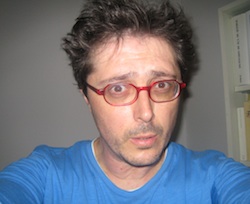Jorge Gimeno
Jorge Gimeno (Madrid, 1964) is the author of two books of poems: Espíritu a saltos [Hurdling Spirit] (Pre-Textos, 2003) and La tierra nos agobia [The Earth Drowns Us] (Pre-Textos, 2011). His poems have been included in the anthology La inteligencia y el hacha. Un panorama de la Generación poética de 2000 [Intelligence and the Ax: A Panorama of the Generation of 2000], by Luis Antonio de Villena (Visor, 2010), among other anthologies. A frequent contributor for the magazines Revista de Occidente, Claves de razón práctica, and Signos, among others, he has also written influential essays on an array of distinguished 20th Century authors, including E.M. Cioran, Fernando Pessoa and Mahmoud Darwish. He has translated Rainer Maria Rilke, Vivant Denon, Paul-Jean Toulet, Wallace Stevens, Eça de Queirós, Fernando Pessoa, the Prince of Ligne and Hérault de Séchelles, and is the author of the much acclaimed anthology El amor negro. Poesía del Barroco francés [Black Love. French Baroque Poetry] (Pre-Textos, 2009). Gimeno has been a professor at the University of Baghdad and in the Instituto Cervantes in Fez, Morocco and Lisbon, Portugal, as well as the recipient of grants and creative fellowships from the Ministries of Culture in Spain, France and Portugal.
Jorge Gimeno (en Español)
Jorge Gimeno (Madrid, 1964), es autor de los libros de poemas Espíritu a saltos (Pre-Textos, 2003) y La tierra nos agobia (Pre-Textos, 2011). Su poesía ha sido incluida en la antología La inteligencia y el hacha. Un panorama de la Generación poética de 2000, de Luis Antonio de Villena (Visor, 2010), entre otras antologías. Ha colaborado en publicaciones como Revista de Occidente,Claves de razón práctica, y Signos, entre otras. Ha escrito ensayos sobre autores del siglo 20th como E. M. Cioran, Fernando Pessoa y Mahmoud Darwish. Ha traducido a Rainer Maria Rilke, Vivant Denon, Paul-Jean Toulet, Wallace Stevens, Eça de Queirós, Fernando Pessoa, el Príncipe de Ligne y Hérault de Séchelles. Es autor asimismo de la antología El amor negro. Poesía del Barroco francés (Pre-Textos, 2009). Ha sido profesor de la Universidad de Bagdad (Irak) y del Instituto Cervantes de Fez (Marruecos) y del Lisboa (Portugal), y ha disfrutado de becas y ayudas a la creación de los ministerios de cultura de España, Francia y Portugal.
Last modified: April 18, 2016

